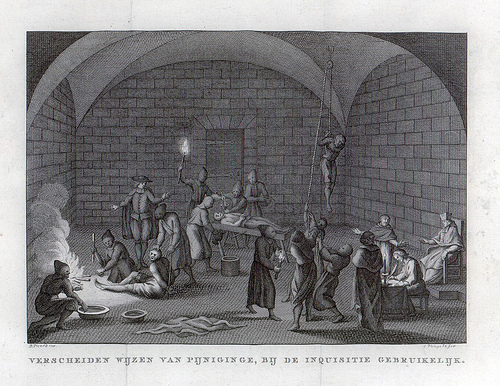We run our website the way we wished the whole internet worked: we provide high quality original content with no ads. We are funded solely by your direct support. Please consider supporting this project.

Read This Before You Drop the H-Bomb (“Heretic”) on a Fellow Christian
Image by yhoitink via Flickr
Greg co-wrote the following article on heresy with Frank Viola for BeliefNet. Check it out!
“Heretic.” It’s a favorite word that many Christians have no problem dropping on the heads of their fellow sisters and brothers.
In common parlance, the term is used to describe any person who disagrees with “orthodox Christian teaching.” The problem, of course, is that there are different perspectives on what exactly constitutes “orthodox Christian teaching.”
Some claim this for Calvinism, while others claim this for Arminianism, or for Roman Catholicism, or for Eastern Orthodoxy.
And we must not forget the many Fundamentalist groups who reserve the term “orthodox” only for people who agree with every one of their distinctive beliefs and/or practices.
2,000 years down the church history pike and the body of Christ is sliced and diced into over 33,000 fragments, some of which pull the heresy lever at everyone else without blinking.
In this essay, we are definitely not going to suggest that false teaching doesn’t exist. It existed at the time of Jesus and Paul, and it exists today.
What we are going to suggest is that many people are using the word “heretic” in ways that are not biblical and/or that do not align with its use in church tradition. And this, we believe, brings disrepute on the body of Christ.
Click here to read the rest of the article on BeliefNet.
Category: General
Tags: Belief, Frank Viola, Heresy, Orthodoxy, Unity
Topics: Following Jesus
Related Reading

Participating in God’s Love
Greg took a slight detour from his reflections on free will in this video in order to talk about Jesus’ prayer in John 17. He discusses the idea that God desires the kind of unity among his children that the triune God enjoys. “He wants our love to participate in the triune God.” In order to…

The Political Ambiguity of Caring for the Poor
Ronn aka “Blue” Aldaman via Compfight In case you think the last post was a veiled endorsement for Obama, here’s an article arguing that Mitt Romney is the candidate to vote for if you really care for the poor. Again, there are many schools of thought and it’s overly simplistic to think that voting for…

Podcast: What is Heresy?
Greg defines ‘Heresy’ and looks at why it is often viewed as a ‘mean-y’ word. http://traffic.libsyn.com/askgregboyd/Episode_0262.mp3

Are You Guilty of Marcionism?
Greg responds to the question of whether or not his cruciform hermeneutic is anything like the heresy of Marcion, who basically advocated throwing out the Old Testament. (Spoiler: it’s not.)

Does Analytic Thinking Make You Less Religious?
Andrew Aghapour wrote an article that was posted in Religion Dispatches questioning the findings of studies that concluded that analytical thinking negatively affects religious belief. In the article, Does Analytic Thinking Erodes Religious Belief? Aghapour argues that there are flaws in the studies and that the biggest culprit was the most likely the population used…

Roger Olson on Evangelicalism
fusion-of-horizons via Compfight Here’s a great interview with Roger Olson on the state of evangelicalism today. Enjoy!
